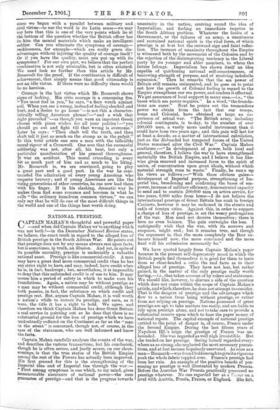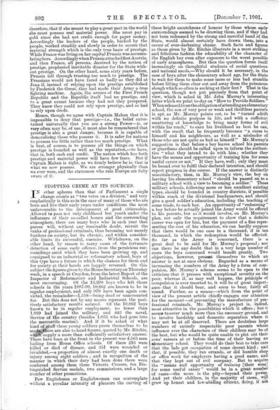NATIONAL PRESTIGE.
CAPTAIN MA HAN'S thoughtful and powerful paper —and when did Captain Mahan wrte anything which -was not both ?—in the December National Review states, we believe, the exact truth in regard to the alleged loss of British prestige in the South African War. He points out that prestige does not by any means always rest upon facts, but is sometimes, in truth, an illusion. And yet, in spite of its possible unreality, prestige is undeniably a valuable ,national asset. Prestige is like commercial credit. A man may have a great deal more commercial credit than he has any strict right to have, and may, indeed; have credit when he is, in fact, bankrupt; but, nevertheless, it is impossible to deny that this unfounded credit is of use to him. It may secure him a period of safety in which to make sure his foundations. Again a nation may be without prestige as a man may be without commercial credit, although they both possess, in fact, the substance on which creclit and prestige rest. But, argues Captain Mahan, it is well worth -a nation's while to restore its prestige, and earn, as it were, the title it has a right to hold. We agree, and -therefore we thinlr Captain Mahan has done Great Britain a real service in pointing out as he does that there is no • Substantial ground for the loss of prestige which we have undoubtedly suffered on the -Continent as far as the "man in the street" is concerned, though- not, of course, in the case of the statesmen, who are well informed and know the facts.
Captain Mahan carefully analyses the events of the war, and describes the various transactions, but his conclusion., -though he is often severe, and justly severe, on our short- comings, is that the true status of the British Empire among the rest of the Powers has actually been improved. His first ground for this is the strengthening of the Imperial idea and of Imperial ties through- the 'war:- ' First among symptoms is one which, to my mind, gives immeasurable assurance of national power—the sure gnarantee Of prestige—and that is the progress towards unanimity in the nation, centring round the idea of Imperialism, and finding tin immediate impetus in the South African problem. Whatever the faults of a Government, or the failures of an army, a unanimous and sustained national spirit is the vital force, of which prestige is at 1:fist but the outward sign and faint reflec- tion. The increase of unanimity throughout the Empire is witnessed both by the movement of the Colonies and by the rejection of the disintegrating tendency in the Liberal party by its younger and abler members, to whom the future belongs. Imperialism has shown itself an idea capable of quickening national self-consciousness, of bestowing strength of purpose, and of receiving indefinite expansion." Then he remarks that the sea power of Britain still remains unimpaired. and he goes on to point out how the growth of Colonial feeling in regard to the Empire strengthens our sea power, and renders it effectual.
We get assurance of local support in many "the bases which sea power requires." In a, word, "the founda- tions are surer." . Next he points out the tremendous power we obtain from the fact that our troops, home and Colonial, have obtained so large an ex- perience of actual war. "The British army, including colonial contingents, is to-day, to the number of over 200,000 men, a vastly more useful instrument than it could have been two years ago ; and this gain will last for at least a decade, as a matter of international calculation, just as the disbanded but tempered forces of the United States remained after the Civil War." Captain Mahan continues :—" In development of power, both local and general, therefore, I believe the war to have strengthened materially the British Empire, and I believe it has hire- wise given renewed and increased force to the spirit of union, of concentration upon great ideals, without which material strength runs to waste.' Finally, he sun's up his views as follows :—" With these obvious gains— development of Imperial purpose, strengthening of Im- perial ties, broadening and confirming the bases of sea- power, increase of military efficiency, denionstrated capacity to send and to sustain 200,000 men on active service, for two years, 6,000 miles from home--I do not believe the • international prestige of Great Britain has sunk in foreign Cabinets, however it may be reckoned in the streets and cafes of foreign cities. Against this, in order to support a charge of loss of prestige, is set the weary prolongation of the war. Men need not deceive themselves ; there is here no even balance. The gain outweighs the loss. I unfeignedly wish that the war, with its sorrows and. suspense, might end ; but it remains true, sad though the argument is, that the more completely the Boer ex- hausts himself now, the more convinced and the more final will his submission necessarily be."
We have quoted largely from Captain Malian's paper because in the present self-deprecatory mood in which the • British people find themselves it is good for them to learn from so clear-headed a critic the real facts as to their alleged loss of prestige. They have not lost, but rather gained, in the matter of the only prestige really worth having,—i.e., that taken account of by rulers and statesmen. We should like, however, to discuss a side of the question which does not come within the scope of Captain Mahan's uticleonsl which, therefore, he does not attempt to-consider. That is the dangers of prestige and the advantages which flow to a nation from being without prestige, or rather • from not relying on prestige. Nations possessed of great prestige are apt to take matters too easily, and are liable to rely upon prestige alone, and not to take care to provide a substantial reserve upon which to base the paper money of national repute. The capital example of national prestige carried to the point of danger is, of coarse, France under the Second Empire. During the last fifteen years of Napoleon M.'s reign the prestige of France was un- bounded. She was regarded as well nigh irresistible. But she traded on her prestige. Seeing herself regarded every- where as so strong, she neglected the most necessary precau- tions, and at last became hopelessly enervated. As soon as a man--Bismarek—was found bold enough to give it a vigorous • push the whole fabric toppled over. France's prestige had been her ruin. An example of the positive benefit of pos- sessing no prestige is well illustrated by modern Prussia. Before the Austrian War Prussia practically possessed no prestige whatever. No one regarded her as a r ser on a level with Austria, Russia, France, or England. She felt, therefore, that if she meant to play a great part in the world she must possess real material power. She must pay in gold since she had . not credit enough for paper money. Accordingly the leaders of the people, backed by the people, worked steadily and slowly in order.to secure that material strength which is the only true basis of prestige. While France was living on her capital Prussia was accumu- lating hers. Accordingly whenPrussiaatta,ckedfirst Austria, and then France, all persons, deceived by the notion of prestige, prophesied inevitable disaster for the State with- out, prestige. On the other hand, some sixty years before, Prussia fell through trusting too much to prestige. The Prussians would not have fared so badly as they did at Jena if, instead of relying upon 'the prestige established by Frederick the Great, they had made their Army a true fighting machine. Again, the armies of the First French Republic and the Republic itself had no prestige, and to a great extent because they had not they prospered. They knew they could not rely upon prestige, and so had to rely upon deeds.
Hence, though we agree with Captain Mahan that it is impossible to deny that prestige—i.e., the belief enter- tained universally that you are a strong Power—is, or very often may be, of use, it must also be remembered that prestige is also a great danger, because it is capable of demoralising those who possess it. It is safer for nations to possess too little rather than too much prestige. What is best, of course, is to possess all the things on which prestige is founded as well as the reputation,—to have, that is, both cash and credit. The nation which has both prestige and material power will have few fears. But if Captain Mahan is right, as we firmly believe he is-, that is what we now possess. We are stronger physically than we ever were, and the statesmen who rule Europe are fully ware of it.































































 Previous page
Previous page